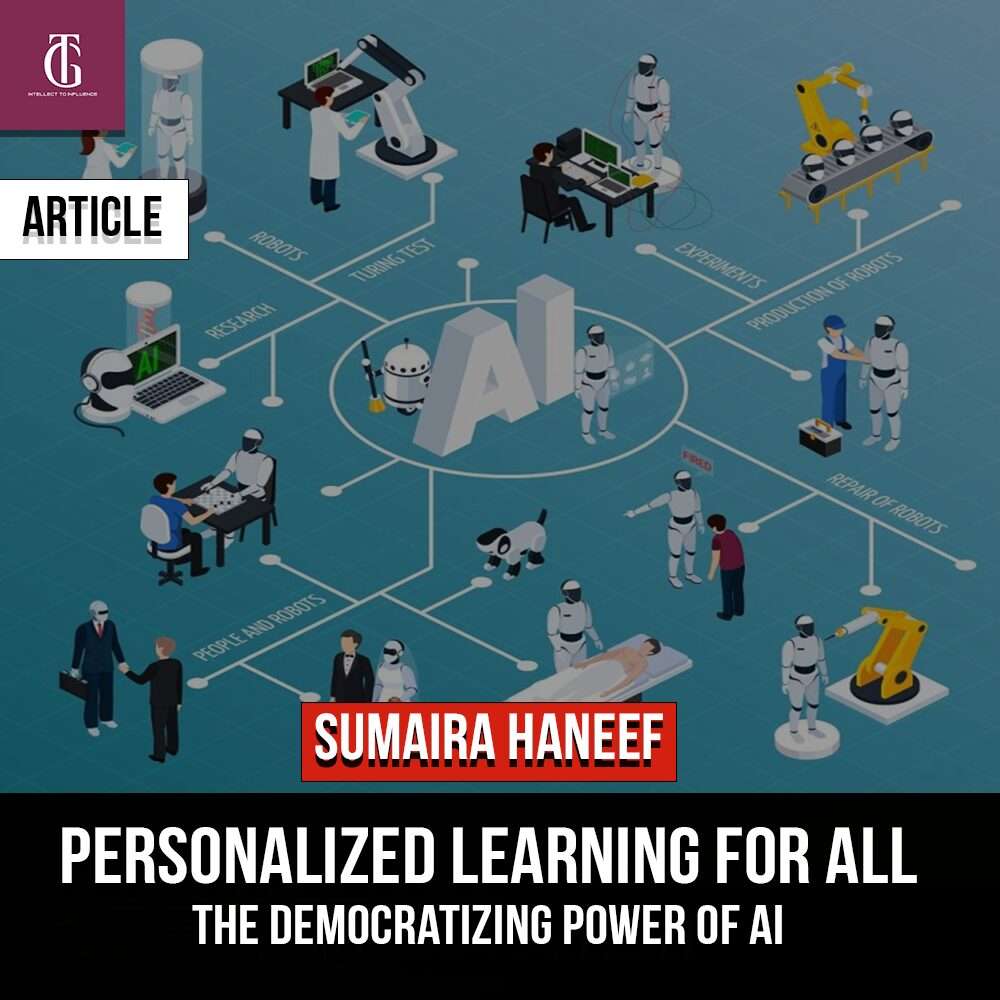
The global education system is undergoing a paradigm shift due to the rapid growth of Artificial Intelligence (AI) tools. AI is revolutionizing education by analyzing large datasets, generating insights, and facilitating personalized learning. AI-powered chatbots and virtual assistants facilitate remote learning, while smart classrooms, virtual tutors, and adaptive learning platforms empower teachers. With over 30 multimillion-dollar-funded AI in education corporations in 2022, analysts predict AI in the education market to be worth over $20bn in five years. It’s crucial to critically examine AI’s ethical implications and potential impact on students, educators, and the system. Post-pandemic, the education sector has shifted towards digital learning, with UNESCO supporting member states in utilizing AI for the Education 2030 Agenda. They aim to address inequalities in access to knowledge, research, and cultural expressions, ensuring AI does not widen technological divides.
Personalized learning (PL) is a method that tailors instruction to individual interests and needs. Advances in technology and AI have increased personalized learning applications, promoting self-regulated learning and cognitive engagement. A hybrid framework combines AI and teachers, focusing on the potential of large language models and contemporary education principles, promoting a knowledge-based education system. Personalized learning is a transformative approach in education that acknowledges each student’s unique learning preferences and strengths. The rise of personalized learning is revolutionizing education by embracing the uniqueness of each student. It aims to tailor the educational experiences to meet individual needs, fostering deeper understanding and retention of knowledge.
Advantages of AI in Personalized Learning:
AI integration is revolutionizing education by enabling personalized learning based on student’s performance, preferences, and real-time feedback. This approach allows educators to develop targeted lesson plans, and recommended materials, and adapt teaching methods. AI-powered personalization uses machine learning algorithms to analyze vast datasets, creating customized learning paths and promoting inclusivity. It also includes automated grading systems, enhancing knowledge retention and allowing students to progress at their own pace. AI optimizes resources, enhances efficiency, and addresses student disengagement by providing adaptive materials and analytical tools.
AI algorithms create personalized learning paths by analyzing individual learning styles and performance data. This enhances student engagement by aligning content with interests and styles. AI also adjusts the learning pace to prevent overwhelm or under-challenged, promoting deeper understanding. This approach improves retention of information by aligning content with students’ cognitive strengths. Real-time feedback from AI helps identify strengths and areas for improvement, reinforcing a culture of continuous improvement. AI-powered personalization revolutionizes education by reshaping student engagement and enabling educators to create effective, tailored experiences.
This synergy fosters an inclusive, student-centric education system, ensuring personalized learning. AI and personalized learning catboats enhance the educational process by resolving student queries instantly, promoting self-advocacy skills, and enhancing language learning skills. They automate tasks like sending assignments, responding to emails, and providing feedback. Students can also recommend online study materials and register themselves through the assistance tool.
AI chatbots also help students take charge of their education by soliciting feedback and offering constant reinforcement. They also notify teachers and students about upcoming assignments, events, and achievements. Additionally, AI-enabled chatbots like Duo lingo provide a conversational setting for language learning, improving grammar and pronunciation while engaging students in real-world conversations.
AI and personalized learning are transforming academic performance, with studies showing students in AI-powered environments achieve higher test scores. This is due to the tailored approach, which identifies individual learning styles and addresses gaps, leading to improved assessment outcomes. AI integration helps close learning gaps by identifying struggling areas and providing personalized content and support.
This not only ensures student’s progress but also provides a comprehensive understanding of foundational concepts, making AI a dynamic tool for academic enrichment. AI and personalized learning are revolutionizing the education sector by offering adaptive EdTech platforms, personalized tutoring systems, and multimodal learning experiences. These platforms adapt content based on student performance, provide gamification and interactive elements, and automate evaluation processes. AI-driven education supports accessible and special education, promoting Diversity, Equity, and Inclusion. Predictive analytics and chatbots enable educators to identify weak-performing students and provide assistance. These advancements promote a safer learning environment and uphold values of equality and inclusivity.
Sumaira Haneef
Sumaira Haneef is a student of Educational Leadership & Management from International Islamic University, Islamabad.





